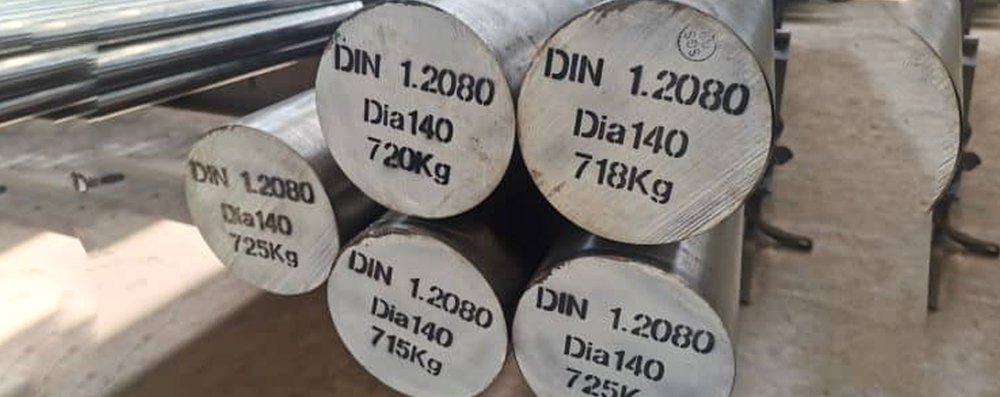Introduction
DIN 1.2080, also known as AISI D3, is a high-carbon, high-chromium cold work tool steel recognized for its exceptional wear resistance, high surface hardness after heat treatment, and dimensional stability. Due to its high carbon and chromium content, 1.2080 offers excellent hardenability and superior resistance to abrasion, making it ideal for applications requiring a hard, wear-resistant surface with good compressive strength.
Uses/Applications:
DIN 1.2080 tool steel is widely used in applications where high wear resistance and minimal distortion are critical:
- Blanking dies
- Forming dies
- Thread rolling dies
- Shear blades
- Drawing dies
- Slitting cutters
- Circular knives
- Cold cutting scissors
- Wire drawing dies
- Coining tools
- Punches for cold work operations
- Wear parts
Properties of the Grade:
- Excellent wear resistance
- High hardness (up to 62 HRC after heat treatment)
- Good dimensional stability
- Deep hardening
- Moderate toughness
- High compressive strength
- Moderate corrosion resistance in hardened condition
- Air or oil hardening capability
Chemical Composition:
| Element | Content (%) |
| Carbon (C) | 2.00 – 2.35 |
| Chromium (Cr) | 11.00 – 13.00 |
| Manganese (Mn) | 0.10 – 0.60 |
| Silicon (Si) | 0.10 – 1.00 |
| Phosphorus (P) | ≤ 0.030 |
| Sulfur (S) | ≤ 0.030 |
The high carbon and chromium contents contribute significantly to the steel’s high hardness and excellent abrasion resistance.
Mechanical Properties:
(Typical properties after heat treatment)
| Property | Typical Value |
| Hardness (Annealed) | ~ 230 – 250 HB |
| Hardness (Hardened) | 58 – 62 HRC |
| Tensile Strength | ~ 1900 MPa |
| Yield Strength | ~ 1500 MPa |
| Elongation | ~ 5 – 6% |
| Impact Resistance | Moderate to Low |
Forging:
Forging Temperature Range: 900°C – 1050°C
Procedure:
- Preheat slowly and uniformly.
- Begin forging at 1050°C and do not let the temperature drop below 900°C.
- Cool slowly after forging, preferably in a furnace or with insulation to avoid cracking.
Physical Properties:
| Property | Typical Value |
| Density | ~ 7.7 g/cm³ |
| Modulus of Elasticity (E) | ~ 210 GPa |
| Thermal Conductivity | ~ 20 W/m·K |
| Specific Heat Capacity | ~ 460 J/kg·K |
| Coefficient of Thermal Expansion | ~ 10.4 × 10⁻⁶ /°C |
Post-forging annealing is recommended to relieve internal stresses.
Heat Treatment:
- Annealing:
- Heat to 850°C – 870°C.
- Hold at temperature for 2-4 hours.
- Furnace cool slowly to below 600°C, then air cool.
- Resulting hardness: ~ 230 – 250 HB.
- Stress Relieving:
- After heavy machining, stress relieve at ~ 650°C for 2 hours and cool slowly.
- Hardening:
- Preheat at 650°C – 750°C.
- Austenitize at 950°C – 980°C.
- Oil quench, or air cool for smaller sections.
- Tempering:
- Double tempering is highly recommended.
- Temper between 150°C and 300°C depending on required hardness.
- Higher tempering temperatures (>500°C) significantly reduce hardness.
Dimensional Tolerances:
- Supplied as hot rolled, forged, annealed, or precision ground.
- Bright bars and ground materials typically adhere to ISO h9/h10 tolerances.
- Custom tolerances available based on specific applications and customer requests.
Machinability:
- Machinability is poor compared to low-alloy steels due to high carbon and chromium content.
- Machining should be performed in the annealed state with proper cooling and carbide cutting tools.
- Use slower speeds and feed rates to avoid excessive tool wear.
Corrosion Resistance:
- DIN 1.2080 offers moderate corrosion resistance in the hardened condition.
- Not classified as stainless steel.
- Suitable for dry and mildly corrosive environments; not recommended for highly humid or aggressive environments without protective coatings.
Weldability:
- Welding is difficult due to high carbon content leading to cracking risks.
- Preheat to 250°C – 300°C and maintain during welding.
- Post-weld heat treatment (stress relieving) is essential to avoid cracking.
- Welding should be avoided unless absolutely necessary.
Available Form:
DIN 1.2080 is available in several standard and customized forms, including:
- Round Bars
- Flat Bars
- Square Bars
- Forged Blocks
- Sheets
- Plates
Supplied in annealed, hardened, tempered, or precision ground condition depending on customer requirements.
Conclusion:
C35 carbon steel is a versatile material offering a good balance between strength, machinability, and toughness. It is widely used in automotive, machinery, and structural applications due to its moderate carbon content and ability to undergo heat treatment. Though its corrosion resistance and weldability are modest, proper surface treatments can enhance performance.
Related Products : D2, DB6, DIN 1.2714, DIN 1.2080, DIN 1.2379, DIN 1.2343, DIN 1.2344, EN31, H11, H13, OHNS, HCHCR, M2, P20+S, P20, P20+Ni, K310, Maps


